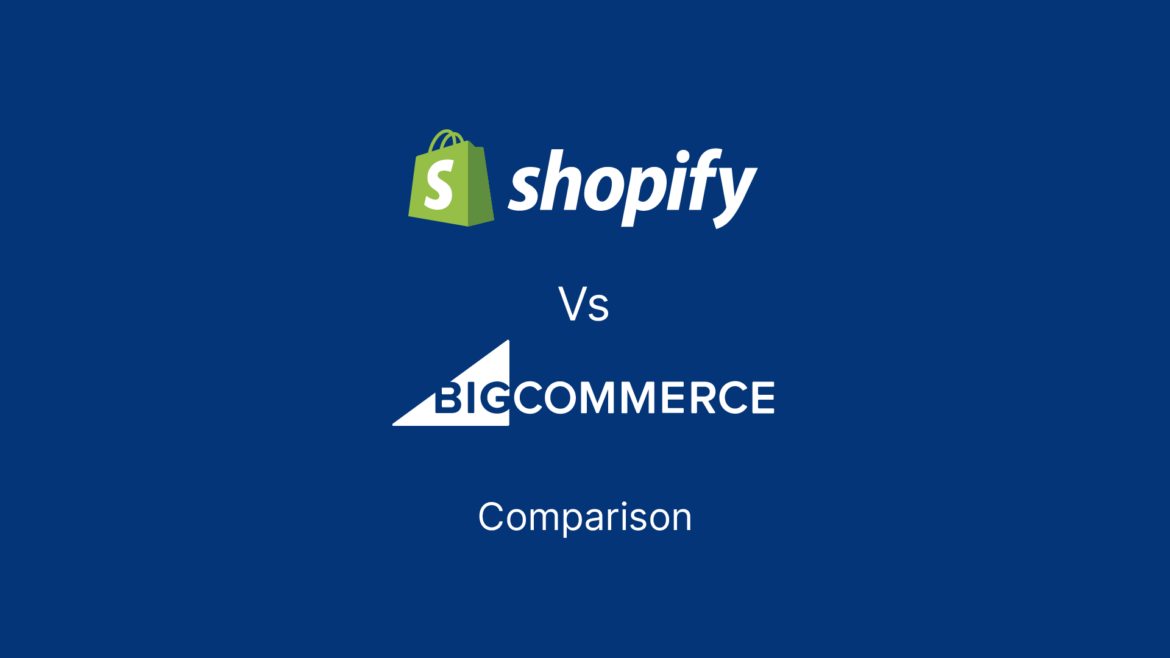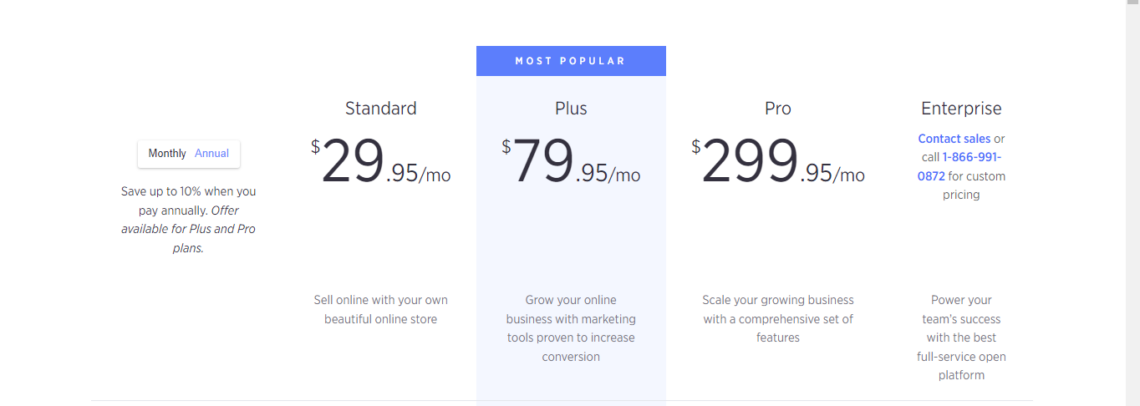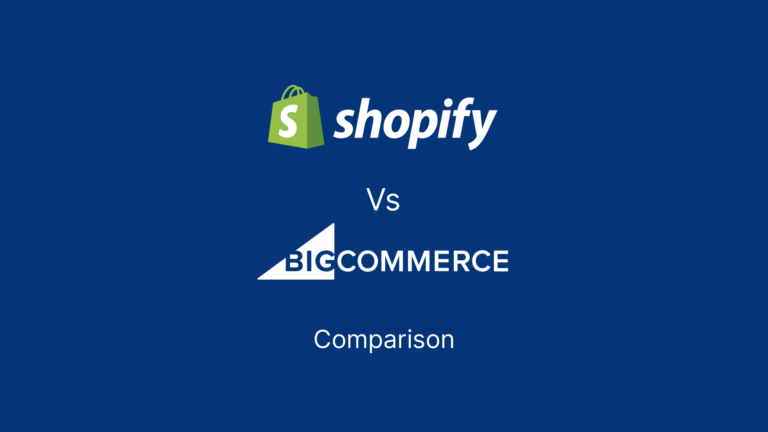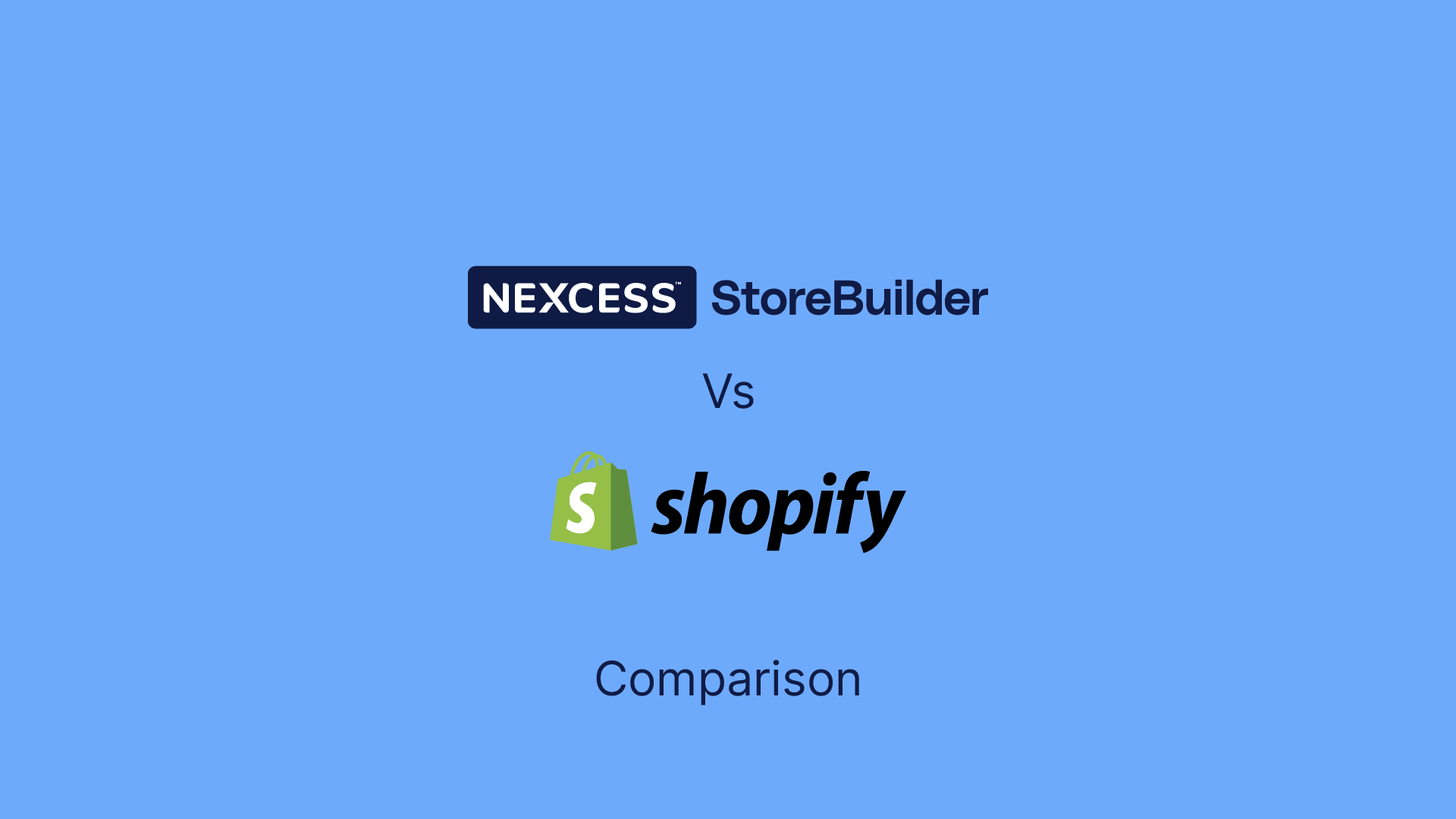Both Shopify and BigCommerce have been in the eCommerce business for several years. Since then, they have grown to be two of the best platforms in the world. They are both powerful ecommerce platforms and can give you great results in your ecommerce business.
They offer a variety of features, including easy setup, design flexibility, and help and support. Since the two platforms are different, one may be better for your store than the other. For example, if you are a large store Shopify is a good fit, BigCommerce is best, mainly online businesses.
In this article, we’ll take a look at some of the most popular features offered by Shopify and BigCommerce. That way you can decide which platform is best for you and your online business.
But before we get into the details of these two giants in e-commerce, let's compare two.

Shopify vs BigCommerce: Overview
Shopify is a great option if you’re looking for a platform that is easy to set up and manage. It also has a large range of features and apps, and offers a wide range of integrations with third-party apps.
BigCommerce is more suited to businesses that have a lot of products or customers using different languages. This is because it has more advanced multilingual and multi-currency capabilities than Shopify does.
Only BigCommerce offers a 15day free trial of September 2022. They both offer free domain name registration and SSL certificate setup.
Both these ecommerce platforms offer similar pricing structures for their plans.
Shopify vs BigCommerce: Pros and Cons
Shopify is a great option for beginners, but it has its flaws. BigCommerce is more feature-rich and powerful, but not as easy to use. For example, Shopify has better marketing tools and customer support while BigCommerce is more secure and has better payment options.
When it comes to Shopify, you get unique theme options which mean you work less in design. They also offer a range of apps from their app marketplace to choose from. With it comes to Shopify, website management is simple with their easy-to-navigate dashboard.
If you want a simple eCommerce platform with advanced features, then Shopify may be right for you. If you prefer a robust platform with tons of options, then BigCommerce might be the best choice for you.
Which Ecommerce Platform Is Better for You?
If you're a small business that's just getting started, Shopify is your best bet. However, if you need more flexibility and the ability to grow your store, then BigCommerce may be the better option for you.
In particular, Shopify offers direct integration with popular dropshipping partners like Oberlo and CJ Dropshipping. With these options you to take advantage of their services without needing any technical knowledge or expensive development costs.
- See Shopify Review
Shopify vs BigCommerce: Pricing
Shopify and BigCommerce have similar pricing structures. Both offer tiered subscriptions with various pricing tiers, as well as an all-inclusive option. Although the monthly fees are higher on BigCommerce, they also charge a lower transaction fee compared to Shopify.
BigCommerce’s cheapest plan is $29.95 to 299.95 per month. Shopify charges between $29 and $179 per month depending on your choice of plan. You get a 10% discount on both if you subscribe on an annual plan.

There are additional costs to running your store on Shopify. On top of their monthly subscription you will be charged a fee per transaction. These range from anywhere between 0.5% to 2% depending on your plan.
This means that if you only sell online occasionally or run an extremely small business, it might make more sense to use traditional payment. For example, use PayPal instead of paying for a monthly subscription service like Shopify or BigCommerce.
Alternatively you can use the shopify lite ($9/month) to use a shopify button on your existing website.

Ease of Use
Shopify and BigCommerce are both user-friendly, intuitive platforms that make it easy to create an eCommerce store. They both use a content management system that easy to understand and use even for a beginner. However, Shopify has a reputation for being easier to use than BigCommerce and is often considered more user-friendly by both experts and customers alike.
While both platforms offer easy-to-use interfaces, Shopify is more intuitive when it comes to setting up your store. They provide more templates than BigCommerce does, which makes building a website much faster and easier. Also, Shopify has add-ons that allow users to add features like chatbots or inventory tracking with ease. Start a free trial to get a fee of shopify.
With BigCommerce, you don’t get easy to use to use tools because its built more for scalability than Shopify. When adding products on shopify, its easy, there are less content requirements. BigCommerce on the other hand, though offering more powerful sales tools can require a learning curve.
There is more to look at when adding products unlike with Shopify.
Design and Store Templates
Shopify has more templates available than BigCommerce. If you want your store to look professional and have a clean, modern design then Shopify is the way to go. There is a slim amount of Free template with both ecommerce platforms. Shopify offers 9 and BigCommerce 12 free themes.
However, if you’re looking for more options and freedom when it comes to designing your own theme, BigCommerce is the better option. Their themes are much easier to customize.
This is because BigCommerce offers an extensive library of different themes that can be easily customized with features such as responsive layouts and parallax scrolling capabilities.
Shopify offers less design options with its themes than BigCommerce does with its templates. BigCommerce offers 150, paid plans and Shopify 70 +.
BigCommerce offers more design options than Shopify does because each theme has its own custom settings for colors, fonts, etc. On Shopify all themes look pretty much the same (with some minor variations). However, if you want something personalized then BigCommerce might be better suited for you since it allows more freedom.
Design Flexibility
Shopify offers an unlimited number of design options for your online store. So it doesn't matter what type of look or feel your site has—they will have a way for you to create it. You can choose from over 70+ pre-made templates or create one from scratch if you'd like something unique for your brand or product line.
BigCommerce also allows customers to select from a wide variety of different templates when building their online stores, but there are fewer options than with Shopify because BigCommerce focuses on selling eCommerce software rather than just selling templates as Shopify does.
Value for Money
BigCommerce has a free plan that has all of the basic features you could need to get started with your own online store. This includes things like product pages, shipping options, payment processing, and more.
Shopify also offers a free plan, but it doesn't include some of the more advanced features like storefront customization and POS integration. If you want these features, you'll need to upgrade to one of their paid plans. They both platforms offer mobile friendly templates which are great since more online sales are made online.
Shopify vs BigCommerce Sales Features
Shopify's platform is a bit limited when it comes to sales features. But what it does offer can be powerful and flexible. They have a big app store to improve your store with the right apps of your choosing. You also get to view your product listings on both to see how your design is looking.
Shopify has a better sales funnel than BigCommerce, with more ways for you to segment your audience and show them the right products at the right time. You can do this by using marketing automation tools like MailChimp or Zapier, which integrate with Shopify easily but are much harder to set up on BigCommerce though they’re getting better.
When selling on BigCommerce, you can sell directly on the Walmart market place. On the other hand, both Shopify and BigCommerce can integrate with FBA. On shopify you can use Auto Multi Channel fulfillment App which is available for free for 50 total orders and you can pay a fee f $19/month when you start selling more.
If you want more advanced segmentation options, like customer experience tagging or custom goals, then you should use agencies that specialize in these sorts of things because their solutions will be best-in-class compared to what Shopify offers out of the box.
BigCommerce has a much better inventory management system than Shopify does. It uses an intuitive drag-and-drop interface where you can see all your products at once rather than having separate sections for each product. This is something Shopify does which makes sense if your store sells multiple types of goods.
Shopify vs BigCommerce Marketing Features
Just like with sales features, BigCommerce has more inbuilt features than Shopify. However, It is worth noting that Shopify has more app integrations to get what you need for your Marketing. With both of the platforms you can get useful features for your marketing.
With BigCommerce, you can create discount codes for customers, and integrate with Google Shopping with one click. Also, you get professional reporting tools. Though not the best for SEO, BigCommerce automatically creates sitemaps, meta tags, and title tags for your website.
In addition, you can create personalized experiences for your customers and use their abandoned cart recovery feature to remind the customers who didn’t complete their purchases.
Every Shopify plan comes with creating discount code, gift cards and analytics for product performance and finance summaries. Shopify’s basic plan give you insight to understand how your products have been selling, but doesn’t give you all the data you may want.
To get access to sales and profit reports, you have to upgrade to a higher plan. With Shopify, you also get auto generated sitemaps, and header tags. You can make edits to your Title tags, metadata and URLs for webpages, blog posts, products and collections.
Customer Support
Shopify and BigCommerce have generally similar levels of support. Both platforms offer phone, email, and live chat support. However, Shopify's customer service is better than BigCommerce's in terms of overall responsiveness and helpfulness.
Both platforms offer extensive support options, including live chat, email support, phone support, help forums, and video tutorials.
Website Features
Shopify has a better website builder, shopping cart, product catalog, reporting, and security. Both platforms offer great website-building tools that allow you to easily create a professional-looking site without any coding knowledge.
Both platforms also offer extensive eCommerce functionality including inventory management tools and order fulfillment functionality.
They both offer different tools for creating a website, but Shopify offers more out of the box. With Shopify, you can create a beautiful online store using their drag-and-drop interface that lets you choose from hundreds of prebuilt templates and add your own design elements without writing code.
The platform also comes with built-in SEO tools so that search engines will pick up on your store automatically when they crawl the web. This results in faster indexing so that potential customers can find you. On top of all this, there are tons of apps available through Shopify's app store like Instagram integration.
Which Platform is Better for you?
Both Shopify and BigCommerce are great platforms with many features that can help your business grow. With your business, your choice of platform depends on your unique needs. If you want to set up a new shop online you might want to setup using Shopify.
If you sell physical goods and need to manage a lot of inventory, then Shopify is likely the best option for you. Shopify may be better suited for dropshipping businesses because it offers more flexible dropshipping options.
Both platforms have top-notch customer support teams that can help you get started in setting up your store or troubleshooting any technical issues as they arise. They also both offer competitive pricing plans starting at just $29/monthly on either platform (Shopify light plan starts at $9/month).
Both eCommerce platforms allow users with different levels of expertise access to their websites by offering multiple levels of personalization according to their skill sets.


